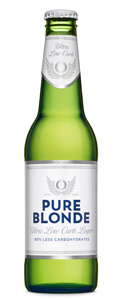
Opinion: The problem with Pure Blonde
Beer has an image problem. We know that.
Whenever the mediahas a story about alcohol issues or health concerns, a fat guy with beer is always trotted out to illustrate the story. When that happens, we all throw our hands up and ask, ‘why beer?’.
 Even large brewers acknowledge the issue. Last year Lion Beer, Spirits & Wine national sales director Mark Powell told a conference that beer had suffered from being poorly understood by the Australian public, citing research undertaken by the Brewers Association that indicated that beer was incorrectly perceived as “fattening”, “a lot less healthy than wine” and laden with chemicals.
Even large brewers acknowledge the issue. Last year Lion Beer, Spirits & Wine national sales director Mark Powell told a conference that beer had suffered from being poorly understood by the Australian public, citing research undertaken by the Brewers Association that indicated that beer was incorrectly perceived as “fattening”, “a lot less healthy than wine” and laden with chemicals.
“There’s a lot of these perceptions among beer drinkers that have pushed them away from the category and are probably stopping other people from entering the category as well,” he said.
While the industry campaign Powelloutlined hasn’t eventuated, Lion is on the verge of announcing its own major campaign designed to challenge myths and negative perceptions of beer at an industry level. This is an important message that is long overdue, and Lion deserves considerable credit for undertaking the campaign alone.
What is our other major brewer doing to bring consumers back to the beer category? It is telling us that if you want to drink beer and still stay healthy, you need a special beer to do it.
Of course, if you ask CUBthey don’t think that’s what they are saying. As Carlton & United Breweries marketing director Richard Oppy explained this week, the company believes it is “actually highlighting that beer is relatively not that bad for you. When you can use a beer like Pure Blonde to go up against wine, which is perceived by a lot of consumers as a healthier alternative, they’ll see that Pure Blonde actually has 50 per cent less caloriesthan wine.”
That might be what CUB hears itself saying, but what the media actually reports – and the general public hears – is that “Carlton United breweries is pushing the beer as the healthy alternative to all other brews.” [emphasis added].
It’s unfortunate that for all of their cleverness in crafting a message, marketers don’t get to also interpret the message that they send. The meaning rests with the customer because what is said matters less than what the consumer hears and consumersfilter the message through their existing perceptions. As the media response to Pure Blonde Ultra shows, those hearing the message are hearing”yes, you’re right – beer is fattening and unhealthy, so have this one instead.”
In saying that there’s only one beer to choose if you “still want to socialise and have a drink and have fun but don’t want the consequences of putting on weight”, CUB’s category approach is to further entrench the negative stereotypes and myths about beer.
Instead of communicating and reinforcing positive messages about beer generally, Pure Blonde’s overt message is to pander to the worst – and erroneous – perceptions of beer, perceptions even they themselves know hurt the category.
It is frustrating to highlight these issues with the company and be told, “peopleare more health conscious these days. Some days you are happy with one beer, others you want to have three or four. All we are doing is just giving people options.”
Unfortunately the message endorsed by dieticians and health experts is that if you want to be healthier thendrink less, not drink fewer carbs. That’s a very inconvenient message when your business is based on selling beer by the carton and having it consumed by the six-pack.
And that’s the real story behind Pure Blonde. As one national retail executive explained it to me, “the marketing truth behind low carb beers is that they are for people who want to feel good about not really changing their behaviour”. It’s a self-delusion that CUB is giving credence to, at the cost of the broader image of beer.
Beer has a problem, but Pure Blonde is not the solution. As they say, the first step to recovery is admitting that you are part of the problem.



